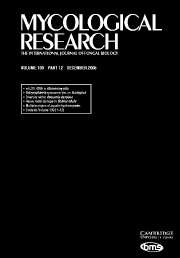Crossref Citations
This article has been cited by the following publications. This list is generated based on data provided by
Crossref.
Myburg, Henrietta
Wingfield, Brenda D.
Wingfield, Michael J.
and
Gryzenhout, Marieka
2003.
Conspecificity of Endothia eugeniae and Cryphonectria cubensis: a re-evaluation based on morphology and DNA sequence data.
Mycoscience,
Vol. 44,
Issue. 3,
p.
187.
Roux, J.
Myburg, H.
Wingfield, B. D.
and
Wingfield, M. J.
2003.
Biological and Phylogenetic Analyses Suggest that Two Cryphonectria spp. Cause Cankers of Eucalyptus in Africa.
Plant Disease,
Vol. 87,
Issue. 11,
p.
1329.
Myburg, Henrietta
Gryzenhout, Marieka
Wingfield, Brenda D.
Stipes, R. Jay
and
Wingfield, Michael J.
2004.
Phylogenetic relationships ofCryphonectriaandEndothiaspecies, based on DNA sequence data and morphology.
Mycologia,
Vol. 96,
Issue. 5,
p.
990.
Rodas, C. A.
Gryzenhout, M.
Myburg, H.
Wingfield, B. D.
and
Wingfield, M. J.
2005.
Discovery of the Eucalyptus canker pathogen Chrysoporthe cubensis on native Miconia (Melastomataceae) in Colombia.
Plant Pathology,
Vol. 54,
Issue. 4,
p.
460.
Gryzenhout, Marieka
Myburg, Henrietta
Wingfield, Brenda D.
Montenegro, Fernando
and
Wingfield, Michael J.
2005.
Rostraureum tropicale gen. sp. nov. (Diaporthales) associated with dying Terminalia ivorensis in Ecuador.
Mycological Research,
Vol. 109,
Issue. 9,
p.
1029.
Gryzenhout, Marieka
Wingfield, Brenda D.
and
Wingfield, Michael J.
2006.
New taxonomic concepts for the important forest pathogenCryphonectria parasiticaand related fungi.
FEMS Microbiology Letters,
Vol. 258,
Issue. 2,
p.
161.
Heath, R. N.
Gryzenhout, M.
Roux, J.
and
Wingfield, M. J.
2006.
Discovery of the Canker Pathogen Chrysoporthe austroafricana on Native Syzygium spp. in South Africa.
Plant Disease,
Vol. 90,
Issue. 4,
p.
433.
Nakabonge, G.
Roux, J.
Gryzenhout, M.
and
Wingfield, M. J.
2006.
Distribution of Chrysoporthe Canker Pathogens on Eucalyptus and Syzygium spp. in Eastern and Southern Africa.
Plant Disease,
Vol. 90,
Issue. 6,
p.
734.
GRYZENHOUT, Marieka
RODAS, Carlos A.
MENA PORTALES, Julio
CLEGG, Paul
WINGFIELD, Brenda D.
and
WINGFIELD, Michael J.
2006.
Novel hosts of the Eucalyptus canker pathogen Chrysoporthe cubensis and a new Chrysoporthe species from Colombia.
Mycological Research,
Vol. 110,
Issue. 7,
p.
833.
Nakabonge, Grace
Gryzenhout, Marieka
Roux, Jolanda
Wingfield, Brenda D.
and
Wingfield, Michael J.
2006.
Celoporthe dispersa gen. et sp. nov. from native Myrtales in South Africa.
Studies in Mycology,
Vol. 55,
Issue. ,
p.
255.
Heath, R. N.
Roux, J.
Gryzenhout, M.
Carnegie, A. J.
Smith, I. W.
and
Wingfield, M. J.
2007.
Holocryphia eucalyptionTibouchina urvilleanain Australia.
Australasian Plant Pathology,
Vol. 36,
Issue. 6,
p.
560.
Chungu, Donald
Gryzenhout, Marieka
Muimba-Kankolongo, Ambayeba
Wingfield, Michael J.
and
Roux, Jolanda
2010.
Taxonomy and pathogenicity of two novel Chrysoporthe species from Eucalyptus grandis and Syzygium guineense in Zambia.
Mycological Progress,
Vol. 9,
Issue. 3,
p.
379.
van der Merwe, Nicolaas A.
Gryzenhout, Marieka
Steenkamp, Emma T.
Wingfield, Brenda D.
and
Wingfield, Michael J.
2010.
Multigene phylogenetic and population differentiation data confirm the existence of a cryptic species within Chrysoporthe cubensis.
Fungal Biology,
Vol. 114,
Issue. 11-12,
p.
966.
Chen, S. F.
Gryzenhout, M.
Roux, J.
Xie, Y. J.
Wingfield, M. J.
and
Zhou, X. D.
2010.
Identification and Pathogenicity of Chrysoporthe cubensis on Eucalyptus and Syzygium spp. in South China.
Plant Disease,
Vol. 94,
Issue. 9,
p.
1143.
Begoude, Aime Didier B.
Gryzenhout, Marieka
Wingfield, Michael J.
and
Roux, Jolanda
2010.
Aurifilum, a new fungal genus in the Cryphonectriaceae from Terminalia species in Cameroon.
Antonie van Leeuwenhoek,
Vol. 98,
Issue. 3,
p.
263.
Pegg, Geoffrey S.
Gryzenhout, Marieka
O'Dwyer, Cecilia
Drenth, Andre
and
Wingfield, Michael J.
2010.
TheEucalyptuscanker pathogenChrysoporthe cubensisdiscovered in eastern Australia.
Australasian Plant Pathology,
Vol. 39,
Issue. 4,
p.
343.
Vermeulen, M.
Gryzenhout, M.
Wingfield, M. J.
Roux, J.
and
Holdenrieder, O.
2013.
Population structure of Chrysoporthe austroafricana in southern Africa determined using Vegetative Compatibility Groups (VCGs).
Forest Pathology,
Vol. 43,
Issue. 2,
p.
124.
Chen, S. F.
Wingfield, M. J.
Roets, F.
and
Roux, J.
2013.
A serious canker disease caused by Immersiporthe knoxdaviesiana gen. et sp. nov. (Cryphonectriaceae) on native Rapanea melanophloeos in South Africa.
Plant Pathology,
Vol. 62,
Issue. 3,
p.
667.
Juárez-Palacios, J. Carlos
Honorato-Salazar, J. Amador
Vázquez-Silva, Luis
and
Parraguirre-Lezama, J.F. Conrado
2013.
Patogenicidad de Chrysoporthe cubensis en clones de Eucalyptus grandis y E. urophylla en el sureste de México.
Madera y Bosques,
Vol. 19,
Issue. 1,
Wingfield, Brenda D.
Ades, Peter K.
Al-Naemi, Fatima A.
Beirn, Lisa A.
Bihon, Wubetu
Crouch, Jo Anne
de Beer, Z. Wilhelm
De Vos, Lieschen
Duong, Tuan A.
Fields, Christopher J.
Fourie, Gerda
Kanzi, Aquillah M.
Malapi-Wight, Martha
Pethybridge, Sarah J.
Radwan, Osman
Rendon, Gloria
Slippers, Bernard
Santana, Quentin C.
Steenkamp, Emma T.
Taylor, Paul W. J.
Vaghefi, Niloofar
van der Merwe, Nicolaas A.
Veltri, Daniel
and
Wingfield, Michael J.
2015.
Draft genome sequences of Chrysoporthe austroafricana, Diplodia scrobiculata, Fusarium nygamai, Leptographium lundbergii, Limonomyces culmigenus, Stagonosporopsis tanaceti, and Thielaviopsis punctulata.
IMA Fungus,
Vol. 6,
Issue. 1,
p.
233.




